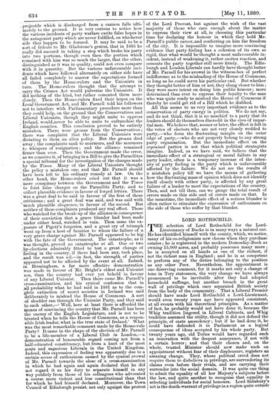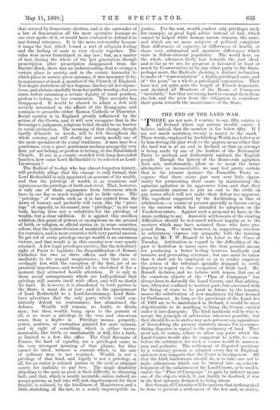LORD ROTHSCHILD T HE selection of Lord Rothschild for the Lord-
Lieutenancy of Bucks is in many ways a natural one. He has identified himself with the county, which, we notice, many of his co-religionists now choose when they purchase estates ; he is registered in the modern Domesday-Book as owning 15,000 acres, and probably possesses many more ; he is accepted on all hands as one of the richest, if not the richest man in England; and he is as competent to perform any of the duties belonging to the position as any other Peer. Nevertheless, the appointment is one deserving comment, for it marks not only a change of tone in Tory statesmen, the very change we have always pronounced to be inevitable after they had adopted household suffrage, but another breach in the great wall of privilege which once separated British society from the body of the community. That a Liberal Premier should have made Lord Rothschild a Lord-Lieutenant, would even twenty years ago have appeared consistent, at all events with his theoretical principles. As a matter of fact, he probably would not have done it, because the Whig tradition lingered in Liberal Cabinets, and Whig tradition assumed the utility, though it did not defend the principle, of caste ascendency; but if he had done it, he could have defended it in Parliament as a logical consequenee of ideas accepted by his whole party. But twenty years ago, old Tories would have regarded such an innovation with the deepest annoyance, if not with a certain horror ; and that their chosen and, on the whole, trusted Minister should now make such an appointment without fear of their displeasure, registers an amazing change. They, whose political creed does not require them to disbelieve in. privilege, are surrendering its claims even before their rivals, and are carrying their surrender into the social domain. It was quite one thing to admit the equality of all her Majesty's subjects before the law„ and quite another to recognise that equality in selecting individuals for social honours. Lord Salisbury's act is the death-warrant of privilege in a region quite outside that covered by democratic election, and is the surrender of a law of demarcation all the more operative because no one ever spoke of it, or would have ventured to defend it in any formal utterance. It is the more noteworthy because it snaps the link which bound a sort of religious feeling and the feeling of caste so very closely together. The rules were never formulated in any law ; but, as a matter of fact, during the whole of the last generation, though proscription after proscription disappeared from the Statute-Book, there was an understanding that to occupy a certain place in society, and in the county hierarchy to which place in society gives entrance, it was necessary to be, in appearance at least, a member of the Church of England. You might disbeliebe all her dogmas, disobey all her injunc- tions, and abstain carefully from her public worship; but you must, before assuming a certain dignity of rural position, profess to belong to her communion. That necessity has disappeared. It would be absurd to admit a Jew still actively interested in the affairs of the Synagogue, and continue to proscribe either Roman Catholic or Dissenter. Social opinion is in England greatly influenced by the action of the Crown, and it will now recognise that in the Sovereign's judgment, religious belief should be no barrier to social promotion. The meaning of that change, though hardly definable in words, will be felt throughout the whole country, and will slowly but surely modify one of the most operative of its social traditions. A man may be a gentleman, even a great gentleman ranking among the very first, yet not belong, or profess to belong, to the Established Church. If not, in a county crowded with long-descended families, how came Lord Rothschild to be selected as Lord- Lieutenant ?
The Radical of to-day, who has almost forgotten history, will probably allege that the change is only formal, that Lord Rothschild is only appointed on account of his wealth, and that the privilege of wealth is as vexatious and injurious as the privilege of birth and creed. That, however, is only one of those arguments from bitterness which have in our day so much weight and so little value. The " privilege " of wealth, such as it is, has existed from the dawn of history, and probably will exist, like the " privi- lege " of capacity, to its sunset, true "privilege," in its vast bulk, having been not a substitute for the privilege of wealth, but a clear addition. It is against this needless addition, this grant of powers or exemptions on the ground of birth, or religion, or official status, or, in some countries, colour, that the better division of mankind has been warring for centuries, and in most countries with very partial success. To get rid of every privilege except wealth is an enormous victory, and that result is in this country now very nearly attained. A few legal privileges survive, like the hereditary right of Peers to legislate, the disqualification of Roman Catholics for two or three offices, and the claim of landlords to the unpaid magistracies ; but they are ex- ceedingly few, with the exception of the first, are of no practical importance, and would all be abolished if for a moment they attracted hostile attention. It is only in those social arrangements which are half-political that privilege still asserts itself with effect, and will no doubt die hard. If, however, it is abandoned by both parties in the State, it must die at last ; and in the appointment of Lord Rothschild to a Lord-Lieutenancy, Lord Salis- bury advertises that the only party which could con- sistently defend its continuance, has abandoned the defence. Wealth will remain, no doubt, to divide men ; but then, wealth being open to the pursuit of all, is no more a privilege in the true and obnoxious sense, than a degree is. Privilege means, properly, power, position, or exemption granted for caste reasons, and in right of something which is either incom- municable, like birth, or unattainable at will, like a faith, or limited to a few, like office. The Civil Servants of France, the land of equality, are a privileged caste, in the very strongest meaning of that phrase, for they cannot be tried, without a consent which in the case of ordinary men is not required. Wealth is not a privilege of that kind, and legally is not a privilege at all, for no suitor is refused justice in the civil or criminal courts for inability to pay fees. The single disability attaching to the poor as poor is their difficulty in obtaining bail ; and that, which is nearly incurable, unless, indeed, we accept persons as bail who will risk imprisonment for their friends, is reduced, by the kindliness of Magistrates and a little stretching of the law, to a nearly imperceptible in- justice. For the rest, wealth confers only privileges such, for example, as good legal advice instead of bad, which cannot be helped while human nature remains the same, and which are no more subjects of political complaint than differences of capacity, or differences of health, or those very substantial and operative differences which exist in fellow-citizens' popularity. The world here, on the whole, advances fairly fast towards the just ideal, and so far as we see, its progress is favoured at least as much by Conservatives as by any other party in the State, perhaps more, the Radicals showing a distinct inclination to make of " representatives " a highly privileged caste, and of "the poor," as a whole, a privileged corporation. They have not yet quite gone the length of French democrats, and declared all Members of the House of Commons "inviolable," but they are trying hard to exempt them from the law, and the poor from the obligation to contribute their quota towards the maintenance of the State.







































 Previous page
Previous page